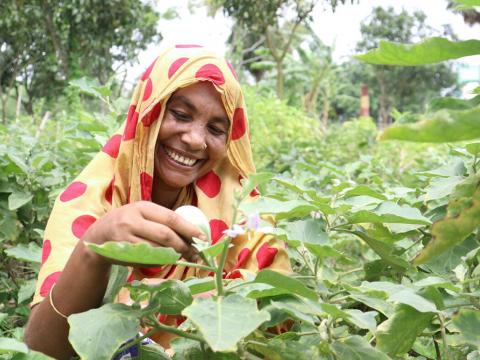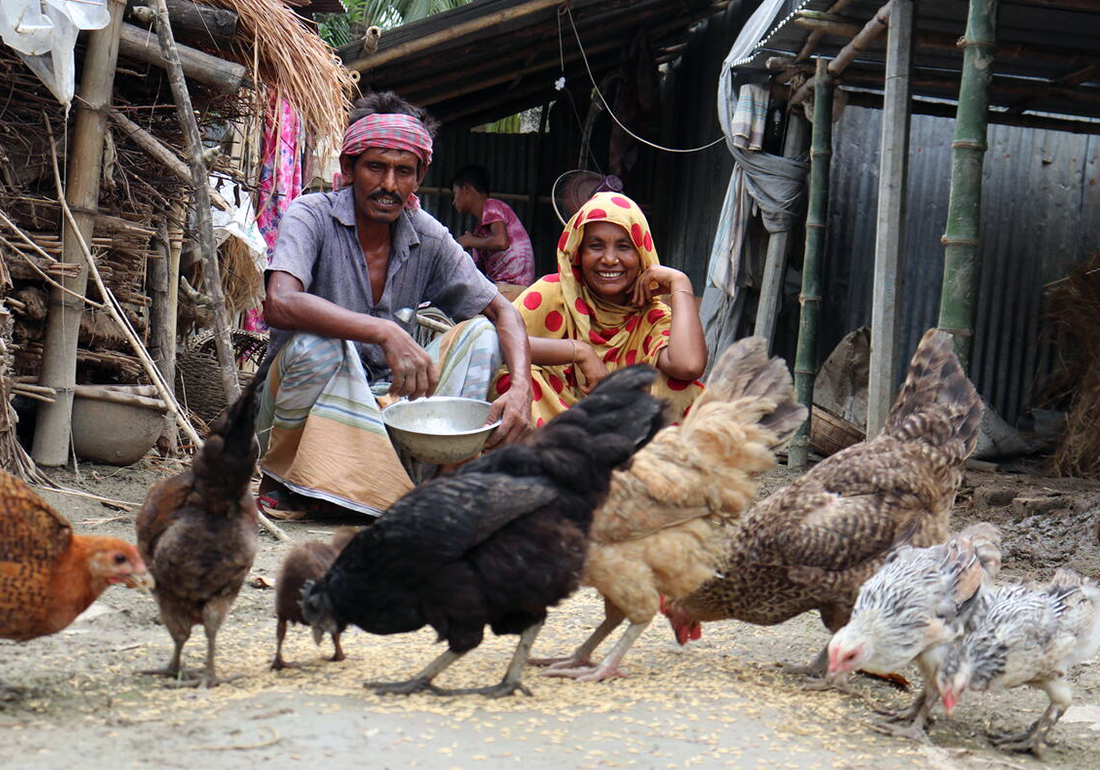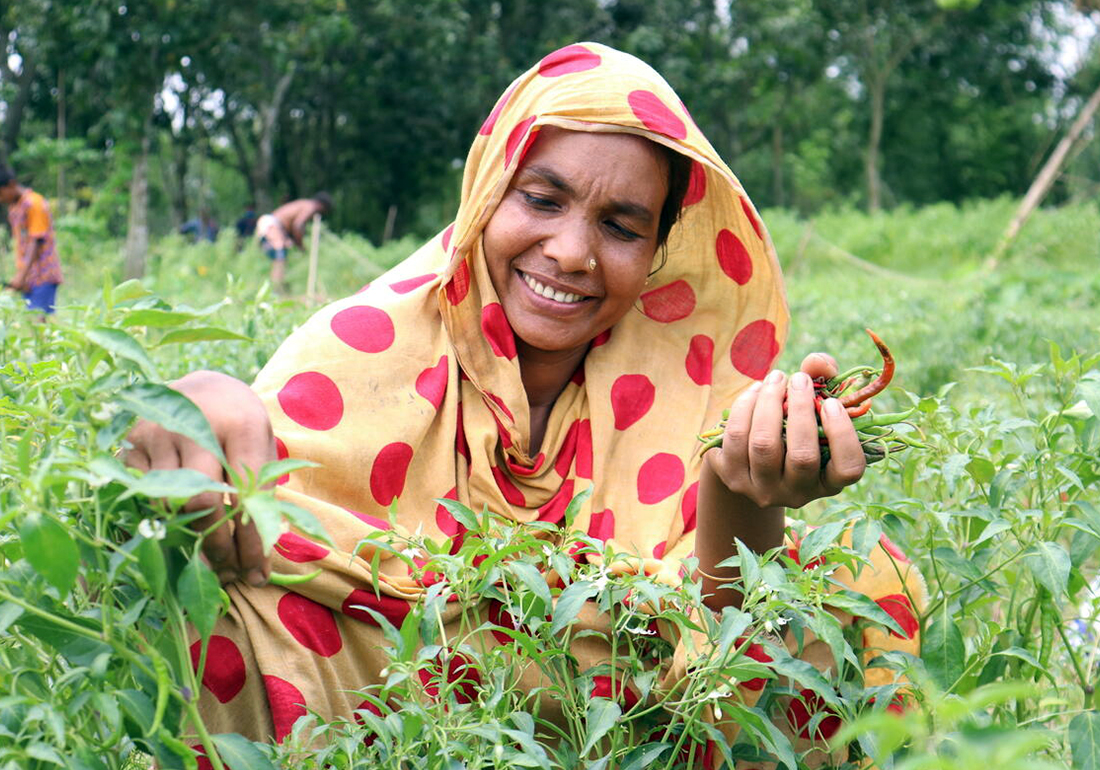A resilient family in the midst of COVID-19

“My morning has never been busy as it is now,” said Ohab, 48-year-old father of two children and husband to Khadija, 45. Every day since the lockdown over 50 days ago, my wife and two of my children have divided our chores around our livestock. While my first-born Abu 19, and I milk the cows and check on the sheep, my wife and Hassan 13, pick up eggs from the chickens and ducks.
“You see, I was among the many affected workers who had to stop working after the lockdown but my story is very different now since I’m now spending more time to invest in my alternative source of income. My family are surprisingly economically secure after taking the initiative to re-invest our time into the only possible thing to do- homestead agriculture production and livestock rearing. We are managing family livelihoods without any external support while many of my neighbours are facing difficulties to secure food during this COVID-19 situation,” says Khadija Begum with a broad smile.
The COVID-19 impacted her community and village as well. She adds with a sad tone, “Behind my house, there is a World Vision Learning Root center, where 20 students of 3-5 years were studying. Now it is closed. Now the learners are in their own home. Also, school-going children are staying at home. They are unable to attend an online class, as there is a lack of television and smartphone facilities at the village level. I have two children who are now studying grade 3 and 10, they also live in the home but not joined the online class as we have not enough facilities”. In addition to this hunger, poverty and child protection issues are increasing day by day. She adds “ I have seen in my village the ultra-poor families are living with hunger. Few days before I have provided some rice and vegetable to three families. If I had more, I will provide more support to the other families”.

According to the Rapid Assessment Report of World Vision Bangladesh. It has observed that due to the COVID-19 “95% of Households’ livelihood activities affected; 89.6% Household income reduced, 94.7 Households no or inadequate food stock. Also, 38.5% children and 58.9% adult took maximum two meals; 80% children reported being unhappy at home during lockdown situation; 34.7% parents/caregivers applied physical punishment to their children as a form of discipline; 77% children are worried about school closure”.
Before the lockdown, my husband was day labour working in Rajshahi City.
Like other families of Bangladesh, my husband has not earned his salary for over two month due to the lockdown. “But the impact of his job loss has not been as many of our friends with little or no alternative trade to earn income. Although our daily income has decreased, we have enough food from the livestock such as milk and eggs from ducks, and hens. We also have an abundance of green leafy vegetable in our homestead area. We also have enough rice stock in our home too,” Khadija, adds with a firm tone.

Khadija’s success did not come to the daylight in a single day. A few years ago, Khadija and her family members were living with hardship condition. Ohab [husband of Khadija] recalls, “It was a very tough time for us. Some really bad days we went to a day or two without a single meal. I could not manage all the family expenses a situation that brought conflict in the home. My children did not look forward to seeing me as I came home every day without food. Getting clothes for my children was a dream”.
In 2018, the family was among those selected as an ultra-poor family [for ultra-poor graduation programme] by World Vision Bangladesh Paba Area Programme. Khadija received different capacity building training on agriculture production and livestock rearing. Considering her vulnerability, World Vision Bangladesh supported her with the heifer and different kinds of vegetable seeds for alternative income creation. She utilized the opportunity very well and COVID 19 has clearly demonstrated the depth.

Khadija cultivates different kinds of vegetables throughout the year. They consume some vegetables for daily need meanwhile sell some for saving money. With the savings, she started dairy farm for duck, hen, and sheep. She took a sheep as a lease from a villager.
She stated that “After six months the cow gave birth of a calf. We consume some milk for us and sell 1.5 litters milk daily that is 75 BDT. Besides, we use the cow dung for vegetable cultivation which reduces the fertilize cost”.
The sheep also gave birth to two lambs. Along with the cows and sheep, they also own 15 ducks and 10 hens in their household. Now they are earning from milk, vegetable and egg. Besides, they took 33 decimal land as a lease to cultivate rice for food security.

Khadija says, “I am fortunate that God has given me the opportunity to overcome poverty. All this would not have been possible without World Vision. Now, there is plenty of vegetable in my homestead which I consume, sell and give to my neighbours who are suffering.”
She hopes that COVID-19 will soon be over so that her children can resume their education and her husband will resume his work in the city. Even though it has worked out well to have an extra hand to help with the agriculture at home, extra income from a salary can go a long way for the family, she says with a smile.
Younger Children Mehedi adds, “As my school is closed. I am staying at home. But, for the tough subject like English and mathematics, it is difficult for me to solve the problem. I feel I need to take help from my teachers. In my home, I practice personal cleaning and maintaining hygiene practice. When I go outside, I use a face mask and keeping a physical distance from my friends. But I am missing my school and friends”.

Mehedi also adds with a big smile “When I will grownup. I will be military to serve the nation”. Abu also adds, “It is very difficult to go outside and meet with the friends. I am staying at home and continuing my education. In my village, people are not so much aware of maintaining personal hygiene. I try to tell them to maintain personal hygiene”.
In the midst of COVID-19, the family also get awareness-raising messages personal hygiene management. Khadija and her husband hope one day their sons will enlighten by education. And they will do a better job and earns handsome money. One day they will build a big house for them.
World Vision Bangladesh has provided over Tk 65 million as a cash grant to 18648 beneficiaries across the country in an effort to support the most vulnerable families during the pandemic crisis. World Vision has donated 843,640 hygiene kits to 12,330 households and 636,112 facemasks to 17,117 families across the country.